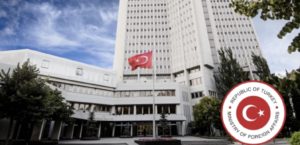Abdullah Bozkurt/Stockholm
A secret Turkish government document from June of this year has revealed that Turkish diplomats have not ceased the unlawful practice of intelligence gathering on critics and opponents in Europe despite warnings from host countries that Turkey must halt its spying activities.
The document, dated June 7, 2022 and stamped secret, was issued by the Security General Directorate (Emniyet), which is part of the Interior Ministry. It mentioned that intelligence was passed to the Emniyet by the Turkish Foreign Ministry on June 2, 2022, which means the ministry compiled the names from reports sent to headquarters by Turkish embassies and consulates.
The document was signed by Erdoğan Kartal, deputy chief of the Emniyet’s counterterrorism department, and distributed to 74 Turkish provinces in a secret message for further police action against Turkish nationals profiled by diplomats abroad.
Apparently concerned about a leak of the document and possible fallout from the scandalous activity in foreign soil, Kartal referred to the source of the intelligence as “the information note obtained from the affiliated (V) institution.” The roman numeral V is the code number for the Foreign Ministry Security and Research Directorate (otherwise known as the intelligence section, or Araştırma ve Güvenlik İşleri Genel Müdürlüğü in Turkish).
Secret document from the Security General Directorate (Emniyet) that reveals recent spying activity by Turkish diplomats abroad:
It is not clear how many people were spied on by Turkish diplomats in this specific instance since the attached document with the full list of names that was forwarded by the Foreign Ministry is missing. But the distribution of the list to 74 provinces based on population registry records suggest hundreds of people must have been profiled as critics of the Erdoğan government abroad.
Another document obtained from the Afyonkarahisar Chief Public Prosecutor’s Office gives some idea of the extent of the spying activity pursued by Turkish diplomats. The document, dated June 21, 2022, cited intelligence that came from a provincial police department on June 8 which in fact had originated from the Emniyet a day earlier. It stated that six people were located in Norway, the Netherlands and Greece and ordered appropriate legal action against them.
The people who were targeted by the Turkish government in foreign countries are believed to be affiliated with the Gülen movement, a group that is highly critical of the Erdoğan government on a range of issues, from pervasive corruption to Turkey’s aiding and abetting of armed jihadist groups.
Document that indicated spying activity by Turkish officials in Norway, Greece and the Netherlands:
In order to avoid a diplomatic backlash and problems at the bilateral level in the event the unlawful spying activities of diplomats were revealed, police chief Kartal warned that the information passed from the Foreign Ministry must be treated on a “need-to-know” basis and was “not to be shared with unauthorized people/institutions.”
Employees of Turkish embassies and consulates have found themselves in hot water in a number of European countries in recent years when they were discovered to have engaged in spying and other unlawful activities.
Two Turkish diplomats, then-Press Attaché Hacı Mehmet Gani and Hakan Kamil Yerge, then-second secretary at the Turkish Embassy in Bern, plotted to drug and kidnap a Swiss-Turkish businessman in 2016. In June 2018 the Office of the Attorney General of Switzerland issued arrest warrants for the two Turkish diplomats and confirmed that they would be arrested upon their entry into Switzerland. According to local reports, criminal proceedings against the two diplomats were launched in March 2017. Yerge left Switzerland in November 2016, whereas Gani remained until August 2017.
The Turkish diplomats were accused specifically of having gathered political intelligence for another state and of having attempted to kidnap a Swiss businessman with Turkish roots. The businessman was reportedly affiliated with the Gülen group and had been living in Switzerland for some 30 years.

Thomas de Maizière, the then-interior minister of Germany, said in March 2017 that it was a “criminal offense” to carry out espionage activities on German soil and that they “will not be tolerated by us.”
“That applies to all foreign states and all intelligence services,” he said with respect to Turkish intelligence tracking of critics.
The repercussions of Turkey’s tracking down of government critics who apparently sought asylum in European countries to escape torture and abuse in Turkey range from abusive legal prosecution to the punishment of their relatives. The documents show that the critics already faced criminal investigations on multiple bogus charges, meaning that they will be prosecuted, jailed and condemned to long prison sentences if they ever go back to Turkey.
In the meantime, their loved ones and relatives could also face vindictive legal action on account of their association with the critics abroad. Their assets would likely be confiscated by Turkish authorities as well.
Diplomats enjoying the privileges and immunities described in the Vienna Convention on Diplomatic Relations are under a duty to respect the laws and regulations of the receiving state and to avoid interfering in its internal affairs as detailed in Article 41. Similarly, consular staff are granted limited privileges and immunities by the Vienna Convention on Consular Affairs, but host state authorities can start investigations and prosecute any of the personnel if they perpetrate crimes inside or outside the consulate premises according to Article 43 of the convention.
Turks who were spied on by Turkish diplomats faced criminal prosecution in Turkey:
The Gülen movement is inspired by Turkish Muslim scholar Fethullah Gülen, a US resident who also faces multiple arrest warrants and an extradition request from Turkey. However, the US government has repeatedly asked the Turkish government for solid evidence of wrongdoing, and Turkey has so far failed to present any evidence that would incriminate Gülen.
Erdoğan, incriminated in a major corruption scandal in 2013 that exposed secret kickbacks in money laundering schemes involving Iranian sanctions buster Reza Zarrab, blamed Gülen for the graft investigations into his family members and business and political associates. He branded the group as a terrorist entity although no violent action has been associated with it, and launched a major crackdown on the group, jailing and/or purging tens of thousands of government employees, unlawfully seizing their assets, shutting down schools, universities, NGOs, media outlets, hospitals and other entities that were owned or operated by people associated with the movement.
Erdoğan added coup charges against Gülen, who denied any involvement in an abortive coup in July 2016 that was branded by many as a false flag operation organized by President Erdoğan and his intelligence and military chiefs. Erdoğan used the event as a pretext to transform NATO’s second largest army into a hotbed of neo-nationalists and Islamists with a purge of almost 80 percent of all generals and admirals. He also acquired “imperial” presidential powers and launched cross-border offensives into Syria.












